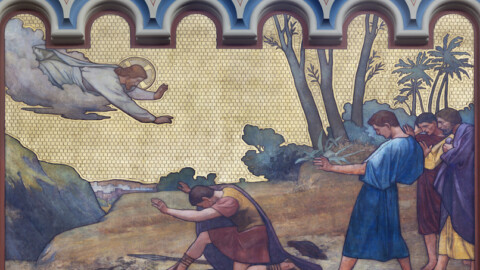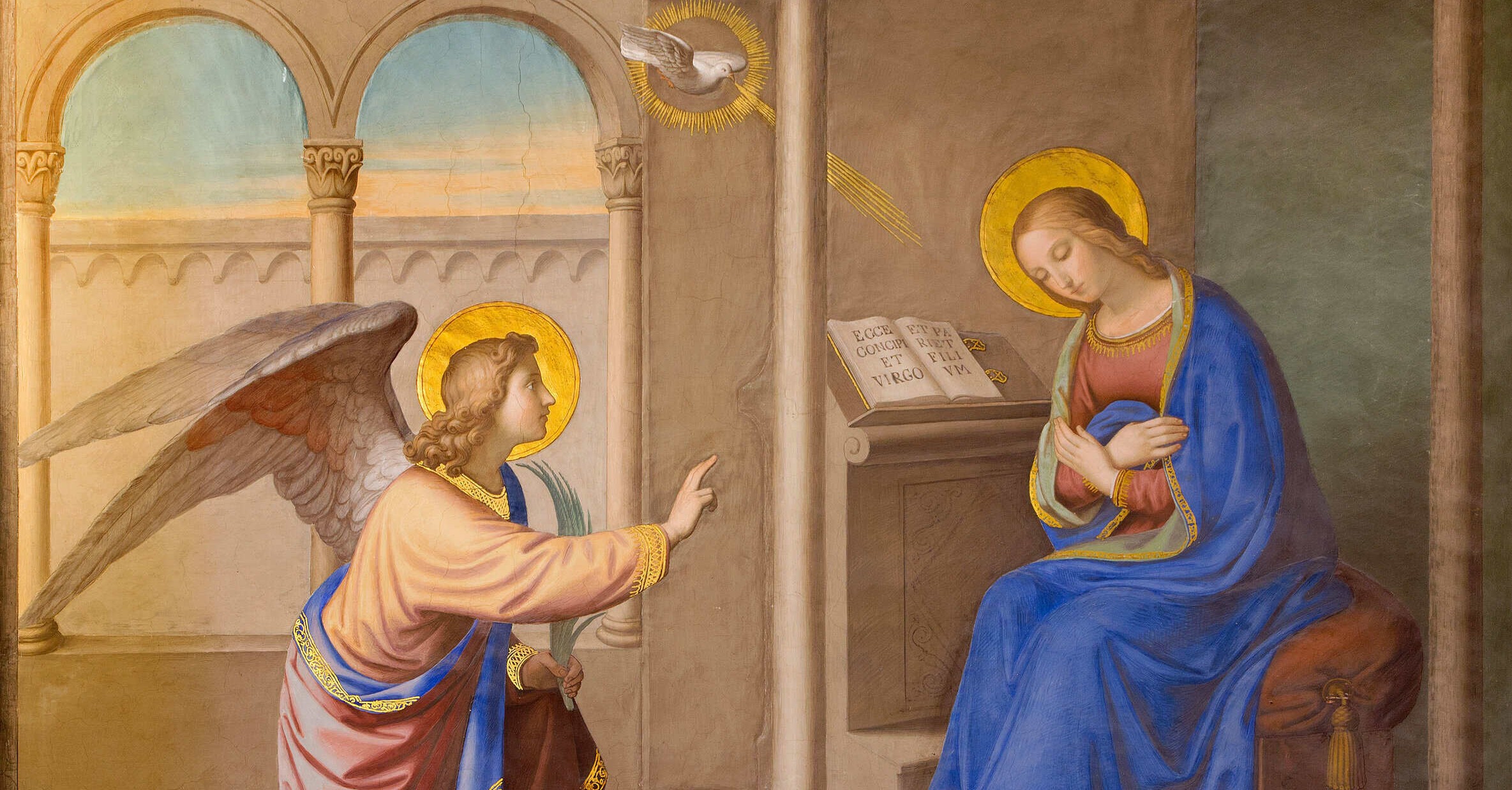1st Sunday of Lent, 6 March 2022
Henri Nouwen said that choices make the difference:
“Two people were in the same accident, and were severely wounded. They did not choose to be in the accident – it happened to them. One of them chose to leave the experience in bitterness, the other in gratitude. These choices radically influenced their lives, and the lives of their families and friends. We have very little control over what happens in our lives, but we have a lot of control over how we integrate and remember what happens. It is precisely these spiritual choices that determine whether we live our lives with dignity.”[1]
There are many things we cannot control, but we can choose how we respond. The pandemic has changed our lives; some people have reacted in a positive way, others in a negative way. If you’re watching on Facebook or YouTube, return to your church – it cannot replace the physical gathering of Christians or the Sacraments. There are many things we can learn. There are things we need to unlearn: anxiety, suspicion that a particular person might infect us, isolation, and individualism. There has been a sense of bearing with each other, being patient, and trying to accommodate families and relatives in one home and share what we have. We’ve experienced the fear of death, which can happen at any time; but the Scripture tells us we should not fear death, because Jesus Christ conquered death on the cross.
We cannot blame anyone for where we are today – life is a series of choices. If your life is not where you think it should be, look back and consider how you made those choices. May we turn to the Lord, and may He help us. He won’t stop us from choosing what isn’t good for us, but He nudges us to come to Him so we might learn to follow and obey Him.
Understanding temptation
Lent was intended to prepare would-be converts for Baptism through Catechism, prayer, spiritual exercises, and exorcism for those who needed to be released from demonic oppression. By the fourth century, through the influence of the monastic movement, many Christians joined in as a refresher course, and participated in spiritual discipline.
The temptation of Christ recalls that of Adam and Eve, and Israel’s forty-year journey in the wilderness. As Adam and Eve were banished from paradise into the wilderness, dragging creation with them, so it was with Israel; Christians should learn from this.[2]
Temptation is a test. Gold must be tested. You were tested in school. Faith must be tested in order to know whether it is sincere, and whether it is feigned or unfeigned. Temptation comes with enticement to attract us to evil and sin, and to persuade us to sin. Often it comes through deception. James 1:13-16 is clear that God does not tempt. Jesus was tempted, but did not sin.
Scripture calls satan the adversary, the fallen angel, the ancient serpent, and the devil. He’s mentioned many times, busy with evil and nefarious activity to ruin the souls of men. It’s good not to have enemies; but once you become a Christian, you have an enemy – God’s enemy, who destroys His creation.
The temptation of Christ
In the first temptation, at the height of Jesus’ hunger, the evil one said, “Turn these stones to bread” – or, “Why don’t you use your privilege and power as the Son of God? Let’s see whether you can turn these stones into bread.” Beyond hunger, did Jesus come to serve Himself or to serve others? To use His miraculous power to serve Himself would have been against God’s will. He was sent to proclaim liberty to the captives, feed the hungry, and change the bread into His body that would give life to the world.
The second temptation was to take the easy way to power and glory. The enemy was saying, “I know what you came for, and I’ll give it to you. You don’t have to go to the cross – only bow down and worship me.” Jesus said, “No, I will not. We’re to worship only God.”
The third temptation was the planting of self-doubt.
Sharing in Christ’s victory
Jesus Christ, like every other human being, knew temptation; however, He never yielded to it. Christ’s sinlessness refers to His obedient refusal to give in to temptation. Mostly we think of obedience as doing something God wants us to do, but we also do things we don’t want to do. Here Jesus’ faith is demonstrated by refusing to disobey His Father. Like Jesus, Christians face temptation, and we must resist it to the best of our ability. While Jesus faced the adversary single-handedly, Christians have a High Priest who stands with us in our struggle against the forces of evil. “Since, then, we have a great high priest who has passed through the heavens, Jesus, the Son of God, let us hold fast to our confession”,[3] unmoved and unwavering.
Israel’s redemption from Egypt foreshadows the overthrow of the demonic Pharaoh, to whom they were slaves. Jesus, on the other hand, overthrew the evil power that held the human race in the vilest bondage. The God-given conquest of the Promised Land by the chosen people, with the defeat of the various threatening nations, prefigured our entrance into the realm of eternal life through the vanquishing of many spiritual enemies who impede our path. Every day, but especially on our great feasts, we celebrate Christ’s victory and our entrance into the land of milk and honey.
Saint Paul said, “Fight the good fight of faith” – faith is something you need to fight for – and, “Work out your salvation with fear and trembling.” Jesus Christ resisted temptation by trusting God’s Word and obeying the Father. On the cross, He triumphed over and disarmed all the powers of evil arrayed against Him. Thanks be to God, we believers can share in Christ’s victory through faith in Him. It’s not our victory, but His. To be a Christian is to face God’s enemy, who constantly questions our status as God’s children – especially when we make mistakes. We need to strive to enter our Promised Land in Christ, and fight the good fight of faith.
Responding to the war
After two years of pandemic, now there is war. This is not a surprise – Jesus said we would experience pestilence and wars. Is it the end of the world? That’s not our business. Live a life of Advent every day, not only in the Advent season. Jesus Christ could come any day. Live a life of Christmas: not only giving, but Christ being birthed in us. Now we go through this time of understanding our frailty; but Scripture does not condemn us – as when the Church reminds us to confess our sins, it’s to showcase the magnitude of God’s forgiveness.
War has catastrophic effects. Many of us have not experienced war; many of our parents have, and have died. It is said that we don’t need a change of men – we need a change in men: regeneration. When we don’t live by the profound change that regeneration brings, we will experience constant conflict.
I’m offering to provide logistics for Filipinos who have fled Ukraine to come to cities in Europe. We’ll do everything we can – Christians cannot sit and do nothing. I applaud those from around the world who are willing to stand with the Ukrainians.

Fight for our Promised Land
Why are the Ukrainians so resilient? Filipinos have also proved to be great warriors. General Douglas MacArthur said, “Give me ten thousand Filipinos, and I will conquer the world”. Some of the bravest soldiers under his command in Korea were Filipinos. I believe the Ukrainians are fighting for their land, and they will not allow anyone to take it from them. Are you fighting for your faith, and for your children’s faith? Are you fighting for the land God wants us to have, or are we satisfied moving from one place to another like nomads? If the Ukrainians are willing to fight and sacrifice for their land, then we also need to fight, seek, and find the land God has given to our church. It requires resilience and sacrifice – you have to fight. Martin Luther King Jnr. said oppressors never give anything to the oppressed – you have to fight for it.
Jesus fought at the temptation mountain for you and me, with cosmic consequences. That was only the beginning of something that ended at the cross. Because of it, you and I have the hope of eternal life.
It’s time to fight for our Promised Land. We’re thankful to be able to gather and worship on Sundays, but God has a place for us. Desire it in your heart, and have a vision – not only to share the faith with our generation, but that when one generation passes, Christians in your country will proclaim God’s Kingdom in a charismatic, evangelical, and sacramental manner.
[1] Fr. Henri J.M. Nouwen, “Spiritual choices” (reflection for 6 January) in Bread for the Journey: A Daybook of Wisdom and Faith (1sted. Harper San Francisco, 1997; reprint HarperCollins, 2006)
[2] I Corinthians 10:1-13
[3] Hebrews 4:14 NRSV









